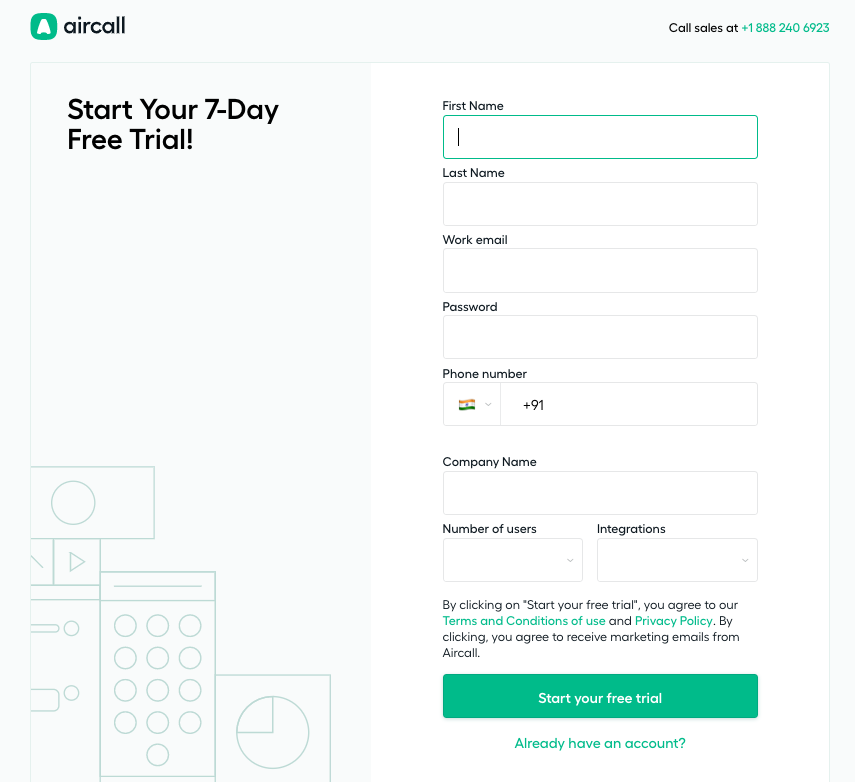As cloud-based telephony systems, both Aircall and Talkdesk do much more than provide just phone numbers and voicemail. They offer advanced VoIP and call conferencing features that make them stand out from the rest of the players in the market.
In this blog, we’ll try to compare and contrast the two cloud telephony tools under the following aspects:
Overall Feature Comparison
Characteristics of an ideal cloud telephony system:
- Affordable, yet high on features.
- Simple, fast setup time.
- Easily Scalable.
- Built for broad use.
While Aircall is a simple cloud telephony system, Talkdesk belongs to the more powerful category of “Call Center Management software” with advanced features. Both Aircall and Talkdesk are tiered, with features distributed across their pricing plans. Let’s do a quick comparison of the standout feature differences:
Getting Started
Signing up for Aircall’s 7-day credit-card-free trial is pretty straightforward. An email is all that is required for verification. Once signed up, it is very easy to create new numbers, set up IVRs, and move people around to different teams if needed. Aircall’s quick search feature makes navigation across the app a breeze.

Aircall Free 7-Day trial sign up page
Creating a Talkdesk account is easy but not quick. You have to fill a form to get in touch with a Talkdesk solutions consultant. Post your interaction with the consultant, you’ll be given a 14-day free trial and a $5 credit to try out and test Talkdesk. During this trial period, you’ll be able to access most of Talkdesk’s telephony features.

Talkdesk getting started page
Aircall and Talkdesk don’t require any hardware or software setup. To get up and running, you just need to get your browser and microphone configurations correct. Live customer support and training/webinar materials are also available readily in both tools, for those who seek it.
Both these tools have applications that can be accessed from popular desktop and mobile platforms.
Pricing
Pricing is a crucial criterion to consider while choosing the best cloud telephony tool for your company. Let’s deconstruct the different pricing plans and uncover some insights.
Aircall’s Essential pricing plan comes in $30/user per month and offers fundamental telephony features like Unlimited inbound calls, 50+ Integrations, API access, IVR, Voicemail, Click-to-Dial, Phone support, etc. This plan is best suited for early-stage startups with very small sales/support teams.
Aircall’s Professional pricing plan starts at $50/user per month and offers significantly more features than its Essential plan. Salesforce integration, Advanced analytics & reporting, Live call monitoring, Call tagging & dispositioning, Queue call back and power dialing – all get unlocked in this tier. This plan is best suited for medium and small businesses.
Aircall also offers Custom pricing plans aligned with your business needs. Advanced features like Custom analytics, Unlimited outbound calls, Custom onboarding, Access to API developer support and Service-level agreement (SLA) are available to cherry-pick. These plans are best suited for large enterprises.

Aircall Pricing Plans
Talkdesk offers two distinct pricing plans – each catering to a different audience. The “Professional Plan” offers features like Power Dialer, Automatic Call Distribution (ACD), Unlimited Call Recording, SMS CSAT surveys, Help Desk / CRM integrations, etc. The “Enterprise plan” gives you everything in “Professional Plan” plus access to advanced capabilities like Real-time Reporting & Analytics, access to SDKs and APIs, Context Mobile, Bring your own Carrier (BYOC), etc. The exact pricing details for these plans are not publically available on Talkdesk’s pricing page.

Talkdesk Pricing Plans
Integrations
Both Aircall and Talkdesk let you enjoy continuous real-time data syncing with other products through integrations. Talkdesk integrates seamlessly with Slack, Microsoft Dynamics CRM, Salesforce, BigCommerce, Zendesk, Google, etc.

Talkdesk Integrations
As evident in the feature comparison, Talkdesk boasts considerably more natives features over Aircall due to the fact that it is a complete contact center software. Aircall heavily relies on third-party apps to help bridge the missing functionalities. There is a significantly higher chance that the SaaS tool that you use at work probably has integration with Aircall.

Aircall Integrations
Aircall has integrations with popular CRM and e-commerce tools like Salesforce, Pipedrive, Zoho CRM, HubSpot, Magento, Shopify, etc.
Aircall’s integration with HappyFox lets you unify your help desk and call center. You can receive inbound calls and make outbound calls from within your help desk software. Learn more.

Aircall Call Widget inside HappyFox Help Desk
Bottom Line
Aircall is an affordable phone system solution that is best suited for small teams. Talkdesk is a full-fledged call center software and is built for large enterprises. Both Aircall and Talkdesk can be a good fit for your company and the choice may boil down to your company size and your budget.
If you are interested in a Unified Communication as a Service (UCaaS) tool, check out our comparison of Ringcentral vs 8×8.















